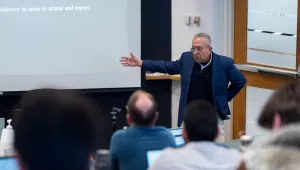An audio recording from Susan Akram, Clinical Professor, Boston University School of Law.
On March 23, 2015 at MEI, Susan Akram presented her latest book Still Waiting for Tomorrow: the Law and Politics of Unresolved Refugee Crises on the legal and political strategies and frameworks of modern protracted refugee crises throughout the world, highlighting the cases of Palestine, Western Sahara, and Tibet and drawing insight from the success of Namibian refugees. Professor Akram outlined the exisiting international legal framework governing refugees, discussing it's theoretical merits before turning to probe weaknesses in implementation in the protracted crises in Tibet, Western Sahara, and Palestine. She examined the political and bureaucratic barriers to realizing the rights outlined in international refugee law and the tensions between pressing for the human rights of refugees versus collective political rights of refugee communities. Finally she opened the case of Namibia, which included a legal strategy in it's successful fight to repatriate refugees from a long conflict with South Africa, suggesting that including a strong legal push with well-led political and economic campaigns for repatriation and nationhood is crucial to securing human and political rights for refugees.
The event was co-sponsored by the Harvard Humanitarian Initiative.
Listen to the full recording of the March 23, 2015 event here:
Click here to view photos on the Belfer Center Flickr page.
About Still Waiting for Tomorrow:
"This book focuses on the common features of protracted refugee situations. It is a critical examination of the reasons underlying the extended nature of those crises, as well as potential solutions to them. The book addresses war and armed conflict, environmental change and natural disasters, statelessness and protection gaps, among other elements, as common origins of refugee crises. It analyzes the root causes of some of the longest-standing unresolved refugee situations in the world today (including, but not limited to, the cases of Palestinians, Sahrawis, and Tibetans), addressing the particular political and legal tensions undermining solutions to them. The book comprises contributions from some of the leading scholars and practitioners in the field of international refugee, human rights and humanitarian law, and international relations." -Cambridge Scholars Publishing
About Susan Akram:
Susan Akram is Clinical Professor at Boston University School of Law, teaching immigration law, comparative refugee law, and international human rights law and supervising students handling international human rights projects and cases in BU’s International Human Rights program. She is a graduate of the University of Michigan-Ann Arbor (B.A), Georgetown University Law Center, Washington DC (JD), and the Institut International des Droits del ‘Homme, Strasbourg (diplome in international human rights). Before joining the faculty at BUSL in 1993, Susan Akram was executive director of Boston’s Political Asylum/Immigration Representation (PAIR) Project and before that, directing attorney of the immigration project at the public interest law firm of Public Counsel in Los Angeles. She is a past Fulbright Senior Scholar in Palestine, and has taught at Al-Quds University/Palestine School of Law in East Jerusalem, the American University in Cairo, and regularly teaches at the Oxford Refugee Studies Centre in the UK. She was also interim director of the program for resettling Iraqi refugees from the camps in Saudi Arabia after the First Gulf War.
Her publications include: Still Waiting for Tomorrow: The Law and Politics of Unresolved Refugee Crises (Akram, Syring, Eds, 2014); International Law and the Israeli-Palestinian Conflict: A Rights-Based Approach to Middle East Peace (Akram, Dumper et al, Eds, 2010); “Immigration and Constitutional Consequences of Post 9-11 Policies Involving Arabs and Muslims in the United States: Is Alienage a Distinction without a Difference?” (with Maritza Karmely, UC Davis L.Rev., 2005); “The Aftermath of September 11, 2001: The Targeting of Arabs and Muslims in America,” (Arab Studies Q’ly, 2002); “Temporary Protection as an Instrument for Implementing the Rights of Return for Palestinian Refugees,” (with Terry Rempel, Boston Univ. Int’l L. J., 2002). Book chapters include: The Failure of the Two-State Solution (Faris, Ed., 2013), Palestine and the Palestinians in the Twenty-First Century (Davis and Kirk, Eds, 2013), Human Rights and Moral Imperialism (Hernandez-Truyol, Ed., 2002); Civil Rights in Peril (Hagopian, Ed., 2004). Encyclopedia entries published in: Encyclopedia of the Israeli-Palestinian Conflict (Lynne Rienner, 2010); Max Planck Encyclopedia of Public International Law (Oxford Univ. Press, 2012).



